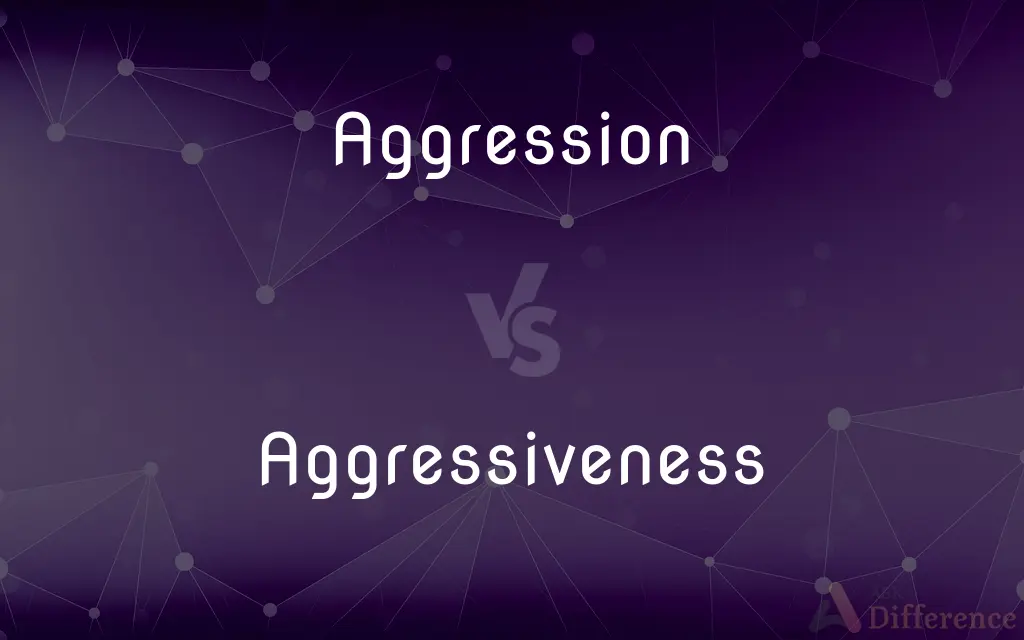Aggression vs. Aggressiveness — What's the Difference?
By Tayyaba Rehman & Urooj Arif — Updated on April 8, 2024
Aggression is an act of hostility, while aggressiveness is a personality trait denoting assertiveness or boldness.

Difference Between Aggression and Aggressiveness
Table of Contents
ADVERTISEMENT
Key Differences
Aggression refers to behaviors or actions aimed at causing harm or asserting dominance, often seen in confrontational or violent acts. On the other hand, aggressiveness is a characteristic of individuals who are assertive, forceful, or bold in their interactions, not necessarily implying harm.
While aggression is situation-specific and can be a response to a perceived threat or challenge, aggressiveness is a more constant behavioral trait that influences how a person approaches various situations, from negotiation to competition.
Aggression can manifest in physical or verbal forms, such as fighting or bullying, highlighting an intent to injure or dominate. Conversely, aggressiveness, though it can lead to aggression, is more about the intensity and persistence of one's actions towards achieving goals, often seen in competitive environments.
Aggression is generally viewed negatively, as it disrupts social harmony and can lead to destructive outcomes. Aggressiveness, however, can be positive or negative depending on the context; it's valued in leadership and sports but less so in cooperative settings where empathy and understanding are required.
While the triggers for aggression are usually external, such as threats or frustration, aggressiveness is an internal trait that propels an individual to take decisive and sometimes forceful action, irrespective of external circumstances.
ADVERTISEMENT
Comparison Chart
Definition
Act of hostility or violence aimed at domination or harm.
Personality trait denoting assertiveness or boldness.
Manifestation
Can be physical or verbal.
Exhibited through persistent, forceful actions.
Context
Situational, often in response to threats.
Constant trait influencing various interactions.
Perception
Generally viewed negatively.
Can be positive or negative based on context.
Trigger
External, like threats or challenges.
Internal, driven by the individual's nature.
Compare with Definitions
Aggression
The practice of making assaults or attacks.
The policy was a response to the enemy's continued aggression.
Aggressiveness
A characteristic that drives individuals to pursue goals with energy and persistence.
His aggressiveness in pursuing his goals set him apart from his peers.
Aggression
A forceful action or procedure, especially when intended to dominate or master.
The boxer's aggression in the ring intimidated his opponents.
Aggressiveness
The quality of being forward or overly assertive.
His aggressiveness at work made him unpopular, despite his effectiveness.
Aggression
Hostile or violent behavior or attitudes.
Aggression in young children often manifests through tantrums and hitting.
Aggressiveness
Behavior characterized by boldness or assertiveness.
Aggressiveness in sports can be a significant advantage.
Aggression
The act of attacking without provocation.
The unprovoked aggression towards peaceful protesters was condemned worldwide.
Aggressiveness
A personality trait that indicates a person's propensity to be bold and assertive.
Her aggressiveness in business negotiations won her many deals.
Aggression
An act of initiating hostilities or conflict.
The sudden aggression by one country towards another shocked the international community.
Aggressiveness
The tendency to behave in a forceful manner.
The player's aggressiveness on the field earned him a reputation.
Aggression
Aggression is overt or covert, often harmful, social interaction with the intention of inflicting damage or other harm upon another individual. It may occur either reactively or without provocation.
Aggressiveness
Characterized by aggression
Aggressive behavior.
Aggression
The act of initiating hostilities or invasion.
Aggressiveness
Inclined to behave in an actively hostile fashion
An aggressive regime.
Aggression
The practice or habit of launching attacks.
Aggressiveness
Assertive, bold, and energetic
An aggressive sales campaign.
Aggression
Hostile or destructive behavior or actions.
Aggressiveness
Of or relating to an investment or approach to investing that seeks above-average returns by taking above-average risks.
Aggression
The first attack, or act of hostility; the first act of injury, or first act leading to a war or a controversy; unprovoked attack; assault; as, a war of aggression. "Aggressions of power."
Aggressiveness
Fast growing; tending to spread quickly and invade
An aggressive tumor.
Aggression
A disposition to behave aggressively
Aggressiveness
Characterized by or inclined toward vigorous or intensive medical treatment
An aggressive approach to treating the infection.
Aggression
A feeling of hostility that arouses thoughts of attack
Aggressiveness
Intense or harsh, as in color.
Aggression
Violent action that is hostile and usually unprovoked
Aggressiveness
(uncountable) The state or quality of being aggressive.
Aggression
The act of initiating hostilities
Aggressiveness
(uncountable) The propensity of a soil or water to dissolve metal or cement structures.
The aggressiveness of various sulfate salts towards concrete is partly related to solubility.
Aggression
Deliberately unfriendly behavior
Aggressiveness
(countable) The result or product of being aggressive.
Aggressiveness
The quality of being bold and enterprising
Aggressiveness
A feeling of hostility that arouses thoughts of attack
Aggressiveness
A disposition to fight
Common Curiosities
How does aggression differ from aggressiveness?
Aggression is an act aimed at causing harm or asserting dominance, whereas aggressiveness is a trait that influences how assertive or bold one is.
Is aggressiveness always negative?
No, aggressiveness can be positive in contexts that value assertiveness and boldness, such as leadership or competitive sports.
Can aggression be positive?
Generally, aggression is viewed negatively due to its association with harm and dominance, though it can be defensive or protective in certain contexts.
What drives aggressiveness?
Aggressiveness is driven by an individual's internal traits and personality, leading them to act assertively or boldly.
How is aggressiveness viewed in the workplace?
Aggressiveness can be valued for assertiveness and decisiveness but may be viewed negatively if it leads to conflict or undermines teamwork.
What is aggression?
Aggression is an act of hostility or violence aimed at causing harm or asserting dominance, which can be physical or verbal.
What defines aggressiveness?
Aggressiveness is a personality trait that denotes assertiveness, boldness, or the propensity to be forceful.
What triggers aggression?
Aggression can be triggered by external factors such as threats, frustration, or perceived challenges.
Can someone be aggressive without being aggressive?
Yes, a person can exhibit aggression, a specific act, without having an overall aggressive personality.
Can aggression be unlearned?
Yes, through therapy and behavior modification, aggressive behaviors can be managed and reduced.
Do cultural perceptions of aggression and aggressiveness vary?
Yes, cultural perceptions can significantly influence how aggression and aggressiveness are viewed, with some cultures valuing assertiveness more than others.
How do aggression and aggressiveness affect relationships?
Both can strain relationships; aggression can cause fear or hurt, while unchecked aggressiveness can lead to misunderstandings and conflict.
Can aggressiveness lead to aggression?
While aggressiveness itself is a trait, it can sometimes escalate into aggression if not moderated.
How can one manage aggressiveness positively?
By channeling aggressiveness into productive activities and ensuring it's expressed in respectful and constructive ways.
Is aggression a learned behavior?
Aggression can be influenced by both genetic factors and environmental influences, including learned behaviors.
Share Your Discovery

Previous Comparison
Animal vs. Critter
Next Comparison
Party vs. ConcertAuthor Spotlight
Written by
Tayyaba RehmanTayyaba Rehman is a distinguished writer, currently serving as a primary contributor to askdifference.com. As a researcher in semantics and etymology, Tayyaba's passion for the complexity of languages and their distinctions has found a perfect home on the platform. Tayyaba delves into the intricacies of language, distinguishing between commonly confused words and phrases, thereby providing clarity for readers worldwide.
Co-written by
Urooj ArifUrooj is a skilled content writer at Ask Difference, known for her exceptional ability to simplify complex topics into engaging and informative content. With a passion for research and a flair for clear, concise writing, she consistently delivers articles that resonate with our diverse audience.















































